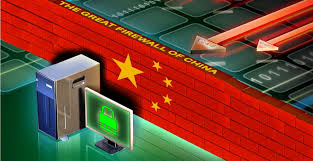
U.S. technology giants which includes the likes of Alphabet and Facebook would probably not be impacted by import tariffs by China against the U.S. because the services provided by such companies are already prohibited in China.
U.S president Donald Trump’s latest round of tariffs on $60 billion of Chinese goods exported into the country was signed on Thursday. Soon, China also announced its plans of imposing tariffs on 128 U.S. made goods as a retaliatory action.
The U.S. tech sector could come under fire if there is escalation in the trade war between the two largest economies of the world even though the sector has not been specifically mentioned to be one of the targets by the Chinese government. But according to experts, the U.S. tech companies would enjoy insulation even if the Chinese government did impose a tariff on them.
For example, the Great Firewall, the government censorship system in China has already blocked Facebook and Google.
China had remained out of the purview of Netfilx when it had made the very aggressive international expansion outside of the U.S. Baidu’s iOivi video platform is used by the streaming service currently to serve a small part of its total content.
In China, Baidu the Chinese tech giant – also codenamed popularly as the Google of China is the dominant search engine there. but the video platforms of Tencent and Alibaba also provide competition to Netflix apart from Baidu.
There is a miniscule presence of Amazon and its retailing business in China and its Prime subscription service was launched in the market only in 2016. The Chinese online shopping market is dominated by domestic companies like Alibaba and JD.com and Amazon has an almost negligible market share there. And compared to even the local players, the cloud business of the e-commerce giant in China is tiny.
For most of the U.S. tech companies, the situation is similar. The growth of the tech sector in China has been significantly hindered by government censorship and regulations for foreign companies. This means that there is just a small business that these companies have in China. And therefore, any tariffs imposed on them would not significantly impact or have very little impact on the overall performance of the companies.
"We continue to strongly believe that given the primarily services nature of traditional FANG names, and very internationally distributed from a revenue perspective, that Facebook, Amazon, Netflix and Google/Alphabet are 'primarily insulated' from tariff worries and a potential retaliatory trade war with China. Ultimately, the bark is much worse than the bite," Daniel Ives, head of technology at GBH Insights, told in a television interview.
However, the most vulnerable U.S. tech company to Chinese tariffs is Apple Inc. It is ar4guably the only large U.S. tech company that runs a decent business in the second largest economy of the world. in the Chinese market, Apple is the fifth largest smartphone vendor. The company generated revenues of $17.9 billion – an increase of 11% year-on-year, from the Greater China region for the period of three months till December 2017.
(Source:www.cnbc.com)
U.S president Donald Trump’s latest round of tariffs on $60 billion of Chinese goods exported into the country was signed on Thursday. Soon, China also announced its plans of imposing tariffs on 128 U.S. made goods as a retaliatory action.
The U.S. tech sector could come under fire if there is escalation in the trade war between the two largest economies of the world even though the sector has not been specifically mentioned to be one of the targets by the Chinese government. But according to experts, the U.S. tech companies would enjoy insulation even if the Chinese government did impose a tariff on them.
For example, the Great Firewall, the government censorship system in China has already blocked Facebook and Google.
China had remained out of the purview of Netfilx when it had made the very aggressive international expansion outside of the U.S. Baidu’s iOivi video platform is used by the streaming service currently to serve a small part of its total content.
In China, Baidu the Chinese tech giant – also codenamed popularly as the Google of China is the dominant search engine there. but the video platforms of Tencent and Alibaba also provide competition to Netflix apart from Baidu.
There is a miniscule presence of Amazon and its retailing business in China and its Prime subscription service was launched in the market only in 2016. The Chinese online shopping market is dominated by domestic companies like Alibaba and JD.com and Amazon has an almost negligible market share there. And compared to even the local players, the cloud business of the e-commerce giant in China is tiny.
For most of the U.S. tech companies, the situation is similar. The growth of the tech sector in China has been significantly hindered by government censorship and regulations for foreign companies. This means that there is just a small business that these companies have in China. And therefore, any tariffs imposed on them would not significantly impact or have very little impact on the overall performance of the companies.
"We continue to strongly believe that given the primarily services nature of traditional FANG names, and very internationally distributed from a revenue perspective, that Facebook, Amazon, Netflix and Google/Alphabet are 'primarily insulated' from tariff worries and a potential retaliatory trade war with China. Ultimately, the bark is much worse than the bite," Daniel Ives, head of technology at GBH Insights, told in a television interview.
However, the most vulnerable U.S. tech company to Chinese tariffs is Apple Inc. It is ar4guably the only large U.S. tech company that runs a decent business in the second largest economy of the world. in the Chinese market, Apple is the fifth largest smartphone vendor. The company generated revenues of $17.9 billion – an increase of 11% year-on-year, from the Greater China region for the period of three months till December 2017.
(Source:www.cnbc.com)














